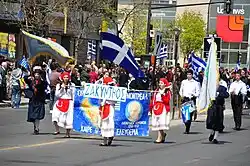The history of the Greek diaspora in Canada is a rich tapestry that spans over a century. Greek immigrants have played a significant role in shaping the cultural, economic, and social fabric of Canada. From the early pioneers who arrived in search of a better life to the vibrant Greek communities that thrive today, their contributions have left an indelible mark on the country.
Research your ancestors on MyHeritage
Early beginnings: late nineteenth and early twentieth centuryEarly beginnings: late nineteenth and early twentieth century

The first Greek immigrants arrived in Canada in the late nineteenth and early twentieth centuries. Most of them originated from the Peloponnese region of Greece. Seeking economic opportunities, many settled in urban centers like Montreal, Toronto, and Vancouver, where they predominantly worked as laborers, particularly in the railway construction, mining, and logging industries. The Greek community faced numerous challenges, including language barriers, discrimination, and unfamiliar cultural practices.
The early Greek immigrants formed tight-knit communities to provide support and maintain their cultural heritage. Societies and organizations were established, such as the Hellenic Community of Vancouver and the Hellenic Canadian Congress, which served as important cultural and social hubs for the Greek diaspora. These organizations helped preserve Greek traditions, language and customs, ensuring they were passed down to future generations.
Community development mid-twentieth centuryCommunity development mid-twentieth century
As the Greek community in Canada grew, so did its cultural presence. In the mid-twentieth century Greek immigrants began establishing businesses, restaurants, and churches, which became focal points for community gatherings and cultural preservation. The establishment of Greek Orthodox churches across the country provided a sense of familiarity and connection to their homeland’s religious traditions.
Post WWII immigration wavePost WWII immigration wave
The aftermath of World War II and the Greek Civil War, brought about significant changes to the Greek diaspora in Canada in the 1950s and 1960s, a new wave of immigrants arrived, escaping the harsh economic conditions and political instability in Greece. The majority of these newcomers settled in larger cities like Toronto, Montreal, and Vancouver, while others ventured to smaller communities across Canada.
Cultural enrichment and community integrationCultural enrichment and community integration
During the 1970s and 1980s, the Greek community in Canada continued to flourish, contributing to the country’s multicultural fabric. Greek Canadians established cultural festivals, dance groups, and language schools to pass down their heritage to future generations. The annual Toronto Greek Town on the Danforth Festival, which began in the 1970s, became a highlight of Greek Canadian cultural celebrations, attracting thousands of attendees from all backgrounds.
One significant milestone in the history of the Greek diaspora in Canada was the nosting of the Montreal Olympic Games in 1976. The Games provided a platform for Greek-Canadians to showcase their cultural heritage and further strengthen their sense of identity. The Panathenaic Stadium, a replica of the original in Athens, was constructed for the event, serving as a symbol of the enduring connection between Greece and Canada.
At the same time, Greek immigrants found success in various fields, such as academia, business, politics, and the arts, further solidifying their presence and integration into Canadian society. Notably, several Greek Canadians became prominent figures in Canadian politics, holding positions at the federal, provincial, and municipal levels.
Examples of some famous Greek Canadians:Examples of some famous Greek Canadians:

- Nia Vardalos: A prominent actress, screenwriter, and producer best known for her work in the film My Big Fat Greek Wedding which became one of the highest-grossing independent films of all time.
- Alex Anthopoulos: A prominent figure in Major League Baseball, Anthopoulos served as the general manager for the Toronto Blue Jays and is currently the general manager for the Atlanta Braves.
- Elias Koteas: An accomplished actor known for his roles in films like Crash, The Thin Red Line, and Shutter Island.
Sample of MyHeritage Canadian collections that specify Greece as the place of birthSample of MyHeritage Canadian collections that specify Greece as the place of birth
- 3,212 born in Greece - 1921 Canada Census
- 1,628 born in Greece - 1911 Canada Census
- 122 born in Greece - 1901 Canada Census
- 39 born in Greece - 1891 Canada Census
- 446 born in Greece - 1916 Canada Census of Alberta, Saskatchewan & Manitoba
- 27 born in Greece - 1906 Canada Census of Alberta, Saskatchewan & Manitoba

